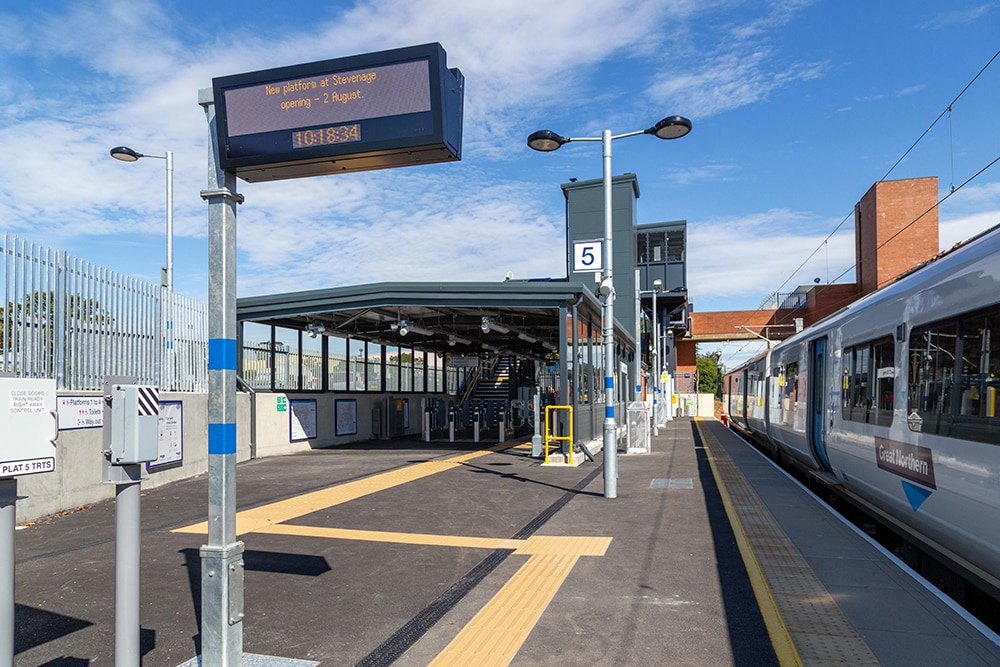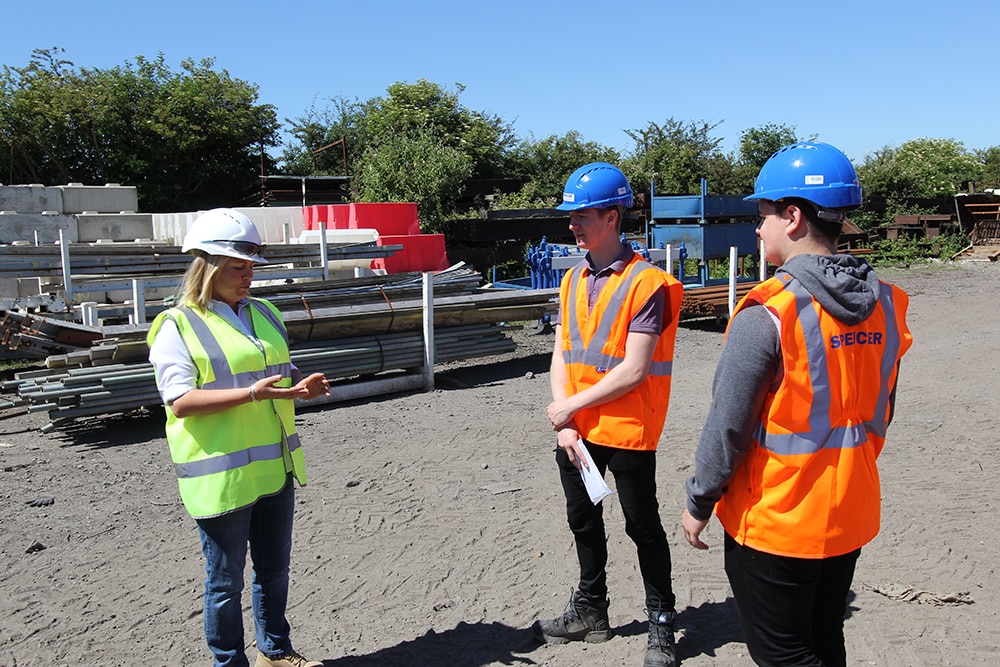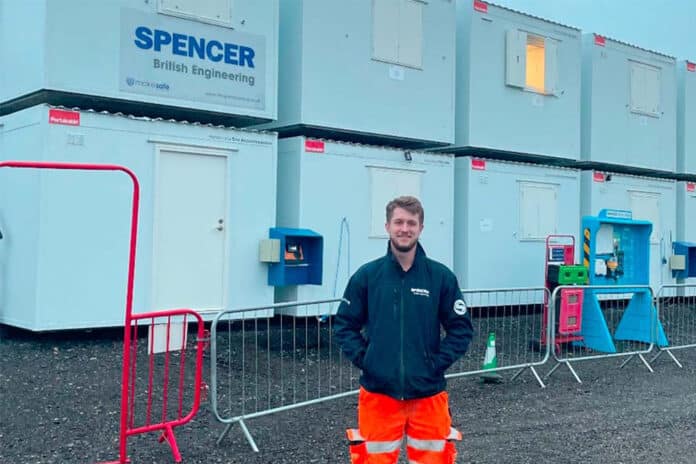Since 2010, apprenticeships have established a proven track record as an alternative to traditional university routes into complex industries. Testing intelligence and resolve, they are helping young engineers find out what they are truly made of – as one former apprentice, now Site Engineer for Spencer Group, tells Rail Business Daily.
It was an especially proud moment when Site Engineer Jack Waslin, 20, stood on a recently completed railway platform in Stevenage.
With his father alongside him, Jack took a moment to appreciate the sheer scale of his accomplishment.
A few months earlier, he had been working on-site alongside his fellow engineers, dressed in orange hi-vis, battling against the additional project challenges brought on by the COVID-19 pandemic that had stunned both the rail industry and wider society.
The task ahead was a significant one; Stevenage needed a brand-new platform, 130 metres long, with nearly two kilometres of new signalling required. The £30 million project would make a huge difference to the route – allowing for more trains each hour to take commuters into London’s Kings Cross. Thanks to the Spencer Group project team’s hard work it was successfully delivered to Network Rail and end-client Govia Thameslink a whole year ahead of schedule.
The project was particularly memorable for Jack, as it was his first. It was here he began his journey as an apprentice, and it was here that he realised what kind of engineer he would become, and what he wanted to achieve in his career.
He put the experience to good use, completing his apprenticeship and becoming a Site Engineer, delivering civils projects for Spencer Group.
“It was a great moment standing there with my dad, looking back on what had been accomplished,” Jack remembers. “Stevenage will always hold an important place in my memory.”

An education in engineering
To understand how Jack became a Site Engineer for Spencer Group, we must rewind the clock back four years.
At school, Jack had always had an interest in engineering – and knew he had the aptitude for it, despite finding conventional, rigid academic settings challenging. The other challenge he faced was, as anyone in the industry knows, that engineering is no small subject. Its application is vast, so knowing what area he would be best suited to would take a real understanding of this complex industry.
His first port of call was the Ron Dearing UTC in Hull, an institution he describes as a critical component to his current working life, post-apprenticeship, as a Site Engineer:
“I felt it was more specified to how I liked to learn,” he said. “It wasn’t just pure academics – there were many more practical aspects to the courses they offered. I was also impressed by the range of industry-standard equipment and software they had, which would get me ready for the world of work.”
It was here he made his first steps on the pathway into construction management, securing a BTEC qualification along the way.
The next step for Jack was tricky; where could he go to find an on-the-job apprenticeship? This daunting stage actually proved much easier than it might have been, as he explains:
“We were visited by businesses at Ron Dearing who supported the college. One of those was Spencer Group, which was a founding partner.
“We regularly got to hear from and speak with people who worked in the field – from Planners to Site Engineers. You got to hear about life at head office as well as on site.
“So, by the time I was going to decide where I wanted to do my apprenticeship, it was all sorted – I knew Spencer Group well already, and the progression felt seamless.”

A grand tour of engineering
As one of Ron Dearing UTC’s Founding Partners, Spencer Group is committed to taking on a new group of apprentices from the pioneering school each year as part of its succession planning and growth. The engineering firm has hired a total of 28 apprentices under the programme in just two years – all coming from Ron Dearing UTC.
At Spencer Group, apprentices are taken on an 18-month tour of the multi-disciplinary engineering firm’s facilities. They get to see different aspects of the business, working with everyone from the SHEQ team to those in design, planning, and out on site. After that, the apprenticeship is then tailored to what they have enjoyed and have discovered a talent for.
“It was during my apprenticeship that I learnt I wanted to be a Site Engineer,” Jack said. “I liked the balance. I did enjoy design, but I struggled with being based purely in an office. Being a Site Engineer means going on site as well as having an opportunity to do design and other office work as well.”
Jack says he discovered his calling on the Stevenage project, his first major project, where the team were building a new turnback facility:
“We were working on Stevenage during the lockdown,” He said. “So, it came with extra challenges, but it was an eye-opener to realise I wanted to be out on site.
“Being on site really helps me enjoy the work back in the office – you truly understand the drawings and plans you are working on. You see how all the work interlocks, how it is all connected. Lines and colours on paper or screen become actual, tangible things.”
From Stevenage, he moved on to carrying out work on the Union Chain Bridge, which crosses between England and Scotland. The structure remains the world’s oldest suspension bridge still carrying traffic and is both a Grade I listed building in England and a Grade A listed building in Scotland.
Now, having completed his apprenticeship, and working on an HND with a view to doing his degree, Jack is back on site at the White Rose station project in Leeds, helping to create two new platforms which will serve the shopping centre of the same name and the Millshaw Business Park.
“It’s great being a Site Engineer,” he said. “It’s impossible to get bored because there are so many different types of work coming up.”
And what advice would he give to upcoming apprentices?
“Make as much of an effort to do your research and weigh up what positives there are to an apprenticeship route. I say there are a vast number of benefits: practical knowledge, which is hard to achieve if you go straight into university; you earn while you learn, and you don’t feel restricted as you might in an academic environment.
“Rather than just reading about projects you experience them first-hand – and importantly, you can learn from your mistakes. Because you will make little mistakes here and there, as everyone does. But in an apprenticeship, people who have been in the industry thirty plus years can teach you another way of approaching the task you might not have thought of yourself.
Jack added: “You have to have initiative and expand on your own experiences. It’s hard work, but it’s very rewarding.”
To find out more about Spencer Group and its opportunities visit: https://thespencergroup.co.uk/apprenticeships/

Photo credit: Spencer Group







































 0113 2082620
0113 2082620 info@railbusinessdaily.com
info@railbusinessdaily.com 15 Mariner Court, Wakefield WF4 3FL
15 Mariner Court, Wakefield WF4 3FL

